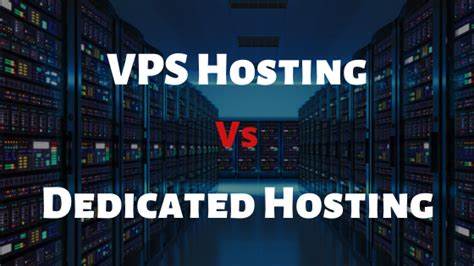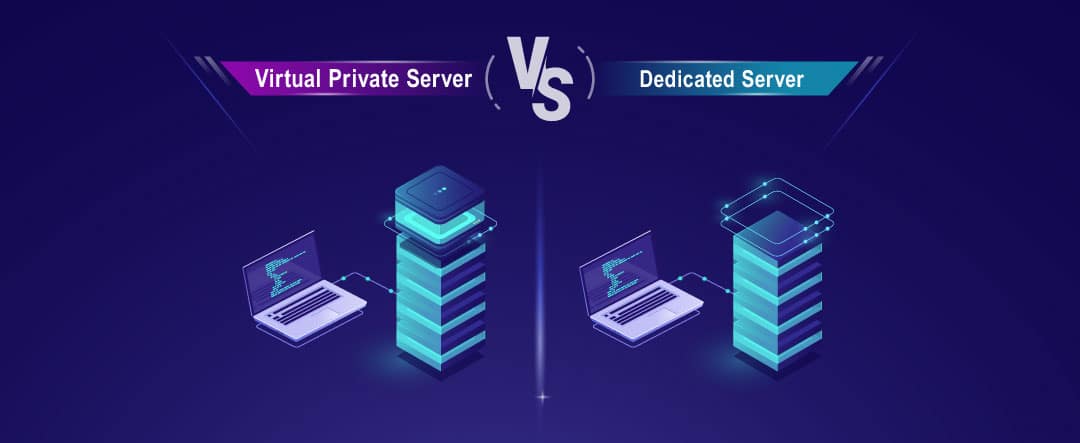
Virtual Private Servers (VPS) and Dedicated Servers are both types of hosting solutions, but they differ in terms of their infrastructure, performance, and the level of control they provide to users. Here’s a breakdown of the key differences between VPS and Dedicated Servers:
1. Resource Allocation:
- VPS: A VPS is created by partitioning a physical server into multiple virtual servers. Each VPS has its own dedicated resources (CPU, RAM, storage), and users share the underlying physical server.
- Dedicated Server: In contrast, a dedicated server is an entire physical server that is exclusively allocated to a single user or client. All resources belong to that user, and there is no sharing with other users.
2. Performance:
- VPS: The performance of a VPS can be affected by other users on the same physical server. If other VPS on the server are using a significant amount of resources, it might impact the performance of your VPS.
- Dedicated Server: Dedicated servers generally offer higher performance because all resources are dedicated to a single user. There is no contention for resources with other users.
3. Isolation:
- VPS: While each VPS is isolated from others on the same server, there is still a level of sharing happening at the hardware level.
- Dedicated Server: Complete isolation is achieved in a dedicated server environment, providing more control and security.
4. Customization and Control:
- VPS: Users have a high degree of control over their virtual environment. They can install and configure software, but there are some limitations compared to dedicated servers.
- Dedicated Server: Users have full control over the server. They can install any software, configure settings, and have the flexibility to customize the environment according to their needs.
5. Scalability:
- VPS: VPS hosting is generally more scalable than shared hosting, allowing users to easily upgrade or downgrade resources based on their requirements.
- Dedicated Server: Scaling a dedicated server usually involves hardware upgrades, which might result in downtime.
6. Cost:
- VPS: VPS hosting is typically more cost-effective than dedicated servers, making it a good choice for businesses with moderate resource requirements.
- Dedicated Server: Dedicated servers are more expensive due to the exclusive use of hardware resources.
7. Use Cases:
- VPS: Suitable for medium-sized websites, small applications, and businesses with moderate traffic and resource requirements.
- Dedicated Server: Ideal for large websites, resource-intensive applications, e-commerce platforms, and businesses with high traffic levels.
In summary, VPS hosting offers a balance between cost, performance, and control, while dedicated servers provide maximum performance and customization options at a higher cost. The choice between VPS and Dedicated Server depends on the specific needs, budget, and technical requirements of the user or business.
8. Virtualization Technology:
- VPS relies on virtualization technologies such as KVM (Kernel-based Virtual Machine) or OpenVZ. These technologies allow multiple virtual servers to coexist on a single physical while maintaining isolation.
9. Resource Scaling:
- VPS allows for easy resource scaling, enabling users to upgrade or downgrade resources like CPU, RAM, and storage based on their evolving needs without significant downtime.
9. Managed vs. Unmanaged:
- VPS hosting plans often come in two varieties: managed and unmanaged. Managed VPS services include server management and technical support, while unmanaged plans require users to handl administration tasks.
10. Cost-Effective for Small to Medium Businesses:
- Small to medium-sized businesses often find VPS hosting to be a cost-effective solution that strikes a balance between performance and budget constraints.
11. Snapshot and Backup Features:
- Many VPS providers offer snapshot and backup features, allowing users to take snapshots of their virtual servers or schedule regular backups for data protection.
Dedicated Servers in Detail:
Bare Metal Performance:
- Dedicated servers provide “bare metal” performance, meaning users have direct access to the entire resources without virtualization overhead, resulting in optimal performance.
Hardware Customization:
- Users can choose and customize the hardware specifications of a dedicated according to their specific requirements. This includes selecting the type of CPU, amount of RAM, and storage capacity.
Full Root Access:
- Dedicated servers grant users full root access, offering complete control over the server’s operating system, software installations, and configurations.
High-Traffic Websites and Applications:
- Dedicated servers are well-suited for high-traffic websites, resource-intensive applications, and scenarios where consistent and robust performance is critical.
Enterprise-Level Security:
- Due to the exclusivity of resources, dedicated servers often provide enhanced security. Organizations with strict security and compliance requirements may prefer dedicated hosting for sensitive data.
Redundancy and Uptime:
- Dedicated servers can be configured with redundant components (such as dual power supplies and RAID configurations) to enhance reliability and minimize downtime.
Conclusion:
In conclusion, the choice between VPS and Dedicated Servers depends on factors such as budget, scalability needs, performance requirements, and the level of control desired. VPS is an excellent choice for those seeking a balance between cost and performance, while Dedicated are preferred when maximum performance, customization, and control are paramount. As technology evolves, both VPS and Dedicated Servers continue to play crucial roles in meeting the diverse hosting needs of businesses and individuals alike.
besbudgethosting also providing VPS and Dedicated server – Buy Fully Managed Linux VPS Hosting in India – BestBudgetHosting & Dedicated Server Hosting India | Get Your Own Server – BestBudgetHosting
Click the URL to know more about the Plans in detailly.

